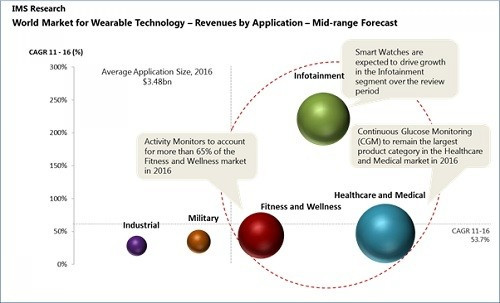Demand For Wearable Technology Bound To Grow Over $6 Billion By 2016: IMS Research

Increasing demand for real-time data in a range of applications will drive demand for wearable technology from 14 million devices in 2011 to over a $6-billion opportunity by 2016, IMS Research has predicted.
The findings are based on a report, "World Market for Wearable Technology - A Quantitative Market Assessment 2012," published by IMS Research Wednesday.
"A $6 billion market in 2016 is our most conservative forecast, which assumes that the adoption of wearable technology will be limited by factors including lack of suitable technology, poor user compliance and lack of an overall enhanced experience from devices that are wearable as compared to non-wearable products. In our mid-range and upside projections, product introductions such as Google's Smart Glasses and the rumored Apple Smart Watch come to fruition and are successful. In addition, an increasingly self-aware consumer seeks more and more data on their health and fitness, leading to even more rapid expansion in the market for wearable technology", Theo Ahadome, Senior Analyst, IMS Research commented in a press statement.
At present, wearable devices are concentrated around a few products mainly in the healthcare, medical, fitness and wellness application areas. There is a greater use-case for wearable technology to transmit data such as vital signs and track user performance.
In future, wearable technology will have a strong impact on smart watches, smart glasses, sleep sensors, industrial and military heads-up display and hand-worn terminals that will result in rapid expansion of market for wearable technology. Introduction of Google's smart glasses and Apple smart watch will be part of the new wave of wireless wearable devices.
The dominant wearable products in use include continuous glucose monitors - from Abbott and Medtronic, activity monitors - Fitbit, Addidas miCoach and Nike Fuelband, and fitness and heart-rate monitors - from Garmin, Polar and Suunto, Ahadome noted in the press release.
The Federal Communications Commission approved a Medical Body Area Network (MBAN), radio spectrum for use in hospitals. The MBAN spectrum is expected to be used in hospitals. However, over time medical instrument vendors said MBAN devices could be used at home where 80% of health care services are delivered, Computerworld reported.
"You don't necessarily want many applications in different places, but in one centralized place," Ahadome said, adding: "Personal fitness records will be cloud based. It becomes a free-for-all in terms of where your data goes."
© Copyright IBTimes 2024. All rights reserved.





















